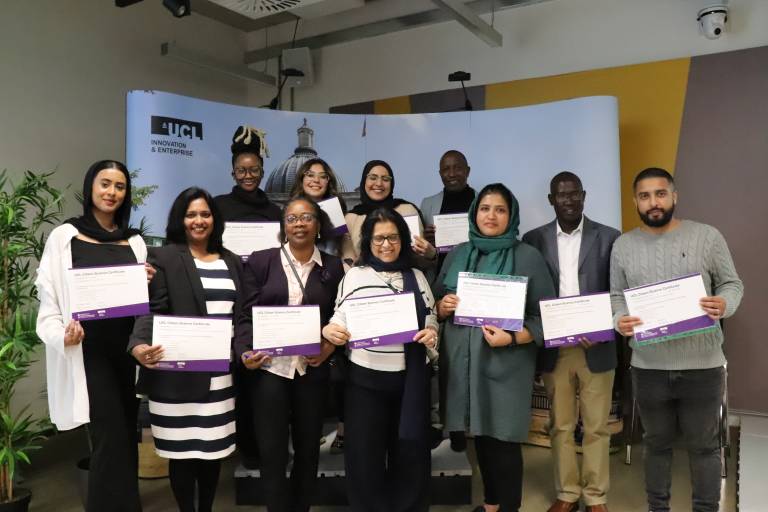IGP launches UCL Citizen Science Academy
16 May 2023
In early May, in collaboration with the UCL Office for Open Science, we launched the UK’s first Academy for citizen science training and awarded the Academy’s first certificates to citizen social scientists.

Opening the event held at UCL Base KX on 5th May alongside IGP’s Director Henrietta Moore, UCL President and Provost Michael Spence spoke about how the Academy represents a major step forward for UCL's citizen science initiatives and commitment to principles of civic education.
Citizen science is radically transforming the way universities are conducting research by embedding lived experiences, closing the gap between decision-makers and the people whose lives will be impacted by such decisions.
The Academy’s training programmes build on the IGP’s work conducted with citizen social scientists in communities in east London, Lebanon, Kenya and Tanzania. The programmes focus on community-based, practice-led learning to empower communities to lead change through social action and shaping policies that impact their livelihoods.
The event, which brought together local government, voluntary organisations, academics and citizen social scientists, was co-hosted by Camden Council, a key partner in IGP’s recent projects, contributing to shaping the Academy and the new Citizen Science Certificate.
Councillor Georgia Gould, Leader of Camden Council, and Mayor of Newham, Rokhsana Fiaz, spoke at the event on the importance of citizen science in addressing the democratic deficit that exists in policy-making, and helping to rebuild the public’s trust in government.
Citizen-led research, Mayor Fiaz said, also broadens the evidence-base that local authorities can tap into and helps them better understand the intersecting and interconnecting nature of deprivation and inequalities.
It’s imperative that, as we proceed in reimagining our neighbourhoods, our spaces and how they are used by people, we ensure that our residents are involved in shaping what that means and what that has to represent for them” said Mayor Fiaz.
The British Academy and the Economic and Social Research Council (ESRC) were also present to provide funders’ perspectives. Professor Julia Black, President of the British Academy, and Professor Alison Park, Executive Chair of the ESRC, discussed with Professor Moore the role of citizen science in research and how funders themselves can help bring community benefit.
For us research ideally has to make a difference, an impact, and the way that we can help with that is by connecting the research through to the people who are going to make use of it, which may be policy-makers, people working in service delivery, or people working in the third sector. A key part of our role is to improve that flow from the people doing the research all the way to the people making use of it” Professor Alison Park, ESRC.
If you’re interested in the UCL Citizen Science Academy and want to know more about how to set up a citizen science research project - such as the Prosperity in east London 2021-2031 longitudinal study - please visit our Academy’s webpage or write to procol.uk@ucl.ac.uk.
 Close
Close

